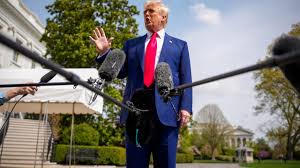Washington - Saba:
US President Donald Trump announced on Monday that foreign governments would have to pay "huge sums" to lift the comprehensive tariffs, describing the tariffs as "medicine." Meanwhile, global financial markets witnessed further turmoil.
Asian stocks suffered heavy losses in early trading, and U.S. stock futures fell sharply, as investors expressed concerns that Trump's tariffs would lead to higher prices, weaker demand, lower confidence, and possibly a global recession.
Trump, speaking to reporters aboard Air Force One, indicated he was not concerned about the losses that have wiped trillions of dollars off stock markets worldwide.
"I don't want anything to go down," he said upon returning from a vacation in Florida. "But sometimes you have to take medicine to fix something."
Trump added that he had spoken with leaders from Europe and Asia during his vacation. These leaders hope to persuade him to reduce the tariffs, which are scheduled to take effect this week, by up to 50 percent.
"They're coming to the table. They want to talk, but there's no talking unless they pay us a lot of money every year," Trump said.
Trump's tariff announcement last week sent global economies into a tailspin. China, for example, quickly imposed retaliatory tariffs, and these new tariffs have raised fears of a global trade war and economic recession.
Investors and political leaders are struggling to determine whether Trump's tariffs will remain in place, are part of a new, permanent regime, or are a negotiating tactic to win concessions from other countries.
Trump's top economic advisors have sought to portray the tariffs as a smart repositioning of the United States in the global trading system.
Treasury Secretary Scott Besant said that more than 50 countries have begun negotiations with the United States since last Wednesday's announcement. Commerce Secretary Howard Lutnick told CBS that the tariffs would remain in place "for days and weeks."
In Italy, Prime Minister Giorgia Meloni pledged to protect companies harmed by the planned 20 percent tariff on goods from the European Union.
Investors sold the dollar on Monday and fled to safe havens such as the yen and Swiss franc after US President Donald Trump imposed sweeping tariffs on the world.
Growth-supporting currencies, such as the Australian and New Zealand dollars, were not spared from the market slump that hurt riskier assets and wiped nearly $6 trillion off the value of US stocks last week, amid growing fears of a global recession, particularly in the United States.

| more of (International) |




